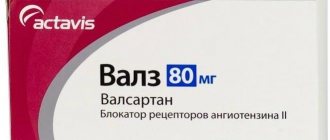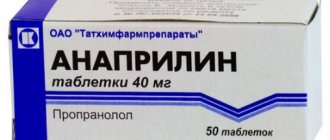For high blood pressure, doctors prescribe drugs from the group of beta-blockers. These are effective drugs that quickly lower blood pressure, cause minimal side effects, and have a positive effect on the functioning of the cardiovascular system. The blood pressure medication Metoprolol belongs to the pharmacological group of selective blockers. It reduces the degree of heart contractions and reduces the excitability of the heart. The drug is prescribed by the attending physician. Self-medication for high blood pressure can be dangerous.
Medicine information
Release form
The drug Metoprolol is available in tablet form. Round tablets are coated with film. Color ranges from white to yellowish. There is an engraving on one side.
Each tablet is packaged in an individual blister cell. Each blister can contain 10 or 14 tablets. The drug comes with instructions for using Metoprolol.
Composition of tablets
The main active ingredient included in the tablets is metoprolol tartrate. One tablet may contain 50 or 100 mg of active substance.
Other components of the tablets:
- silica;
- microcrystalline cellulose;
- magnesium stearate.
The shell includes:
- hydroxypropyl methylcellulose;
- twin 80;
- talc.
Metoprolol tablets
Price and terms of sale
Metoprolol tablets are sold in pharmacies with a doctor's prescription. The price of Metoprolol is about 20 rubles.
Storage mode
Metoprolol blood pressure tablets are recommended to be stored in a dark place with low humidity, protected from children. Storage temperature – from 15 to 25 degrees.
The shelf life of the drug is 5 years from the date of production. After the expiration date, you should not take the tablets. They must be disposed of in accordance with sanitary standards.
Main characteristics of the drug
Metoprolol is a drug from the group of beta-blockers that affects myocardial function and peripheral circulation. It has a moderate antihypertensive (lowers blood pressure), antianginal (relieves cardiac ischemia) and antiarrhythmic (restores heart rhythm) effect. It is actively used in cardiological practice for the treatment of adult pathologies.
The drug has a monocomponent composition, the main active ingredient is metoprolol in the form of tartrate or succinate. The quantitative content varies depending on the form and drug concentration.
Metoprolol is a drug from the group of beta-blockers that affects myocardial function and peripheral circulation
For ease of use in conditions of varying severity and degree of bioavailability, it is produced in two different dosage forms:
- Tablets are white with a brown, pink or yellow tint, round in shape, cross-sectioned and coated - 25 mg, 50 mg, 100 mg and 200 mg of the active substance.
- Injection solution in ampoules with 1% concentration of metoprolol tartrate, 5 ml capacity.
Produced by several pharmaceutical companies, the names may have prefixes, for example, “Metoprolol Stada 200 retard” or “Metoprolog-retard-Akrikhin”. The active substance does not change, only the dosage and auxiliary components differ. It is sold in pharmacies according to a prescription from the attending physician, who determines the required type of drug.
How does it affect blood pressure - increases or decreases
Metoprolol tablets are selective beta-blockers. Metoprolol lowers blood pressure by blocking beta receptors.
Metoprolol to lower blood pressure has the following effects:
- antihypertensive;
- antianginal;
- antiarrhythmic.
The medication quickly reduces blood pressure through all three effects. The pressure decreases quickly and safely, causing virtually no adverse reactions.
The antianginal effect of the drug is associated with a decrease in myocardial oxygen demand. This affects the heart rate, which decreases. The heart begins to beat evenly, having a positive effect on blood flow and pressure indicators. The likelihood of angina attacks is reduced. After taking the tablet, the pressure drops within 15 minutes. The effect of one tablet lasts for 6 hours. The drug has an active analogue, Metoprolol Succinate, with a more pronounced hypotensive effect. The effect of one tablet of Metoprolol succinate lasts for a day. Doctors recommend taking the drug for a long time to achieve stabilization of the condition.
The antiarrhythmic effect is manifested in a decrease in heart rate, lowering blood pressure, and improving the functioning of the nervous system. The drug increases the concentration of cyclic adenosine monophosphate.
The medication helps with blood pressure and reduces the risk of migraines.
You can take Metoprolol for high blood pressure as a monotherapy or in combination therapy with other medications.
The drug acts like all beta blockers
Indications for treatment with Metoprolol
Metoprolol is used as the only treatment for uncomplicated cardiovascular conditions. Indicated for use in the complex treatment of moderate to moderate heart disorders. Prescribed for:
- arterial hypertension (hypertension);
- coronary heart disease;
- angina pectoris;
- heart rhythm disturbances (tachycardia, extrasystoles, arrhythmias);
- cardiomyopathy;
- myocardial infarction;
Prescribed for myocardial infarction
- mitral valve prolapse;
- thyrotoxicosis;
- migraine headaches;
- akathisia (syndrome of constant motor restlessness, “restlessness”).
The drug is used for both therapeutic and prophylactic purposes. Successfully prevents relapses of heart attacks and arrhythmias, relieves angina attacks, prevents migraines, and is useful as a cardioselective agent for bronchial asthma.
Metoprolol is quite effective for hypertension. It gradually and painlessly reduces blood pressure, bringing blood circulation back to normal. Acts as a prolonged agent in monotherapy or in combination with other antihypertensive drugs. Not suitable for emergency treatment of hypertensive crisis. Metoprolol is not used for low blood pressure (hypotension).
Pharmacokinetics of Metoprolol
The drug is almost completely absorbed from the gastrointestinal tract. The maximum concentration is reached 1-2 hours after taking the tablet. The half-life is 3.5 hours.
Bioavailability is 50% upon first use of the tablet; upon repeated use, bioavailability increases to 70%. If you take the tablets with food, bioavailability will increase by 20-40%. Bioavailability is also increased in liver cirrhosis. The connection with blood serum is 10%.
The components of the tablets cross the placental barrier, and a small amount of metabolites have been observed in breast milk.
Metabolic processes take place in the liver. About 5% is excreted in pure form through the kidneys, so dose adjustment is not required for kidney disease. If liver function is impaired, metabolism decreases, so a dosage reduction is required.
Composition and principle of action
The drug Metoprolol belongs to the group of beta-blockers. The main active ingredient of this medicine is metoprolol tartrate. The accompanying components of the drug include substances such as talc, silicon dioxide, titanium dioxide, cellulose, magnesium stearate, dye, etc.
Metoprolol is available in tablet form in dosages of 25, 50 and 100 milligrams. This drug helps block b-adrenergic receptors present in the heart muscle and blood vessels.
Metoprolol has the following effects on the body:
- lowers blood pressure;
- reduces heart rate;
- dilates blood vessels, relieving vascular spasms;
- eliminates increased stress on the heart;
- reduces myocardial excitability;
- reduces the need of the heart muscle for nutrients and oxygen.
After entering the gastrointestinal tract, the active substance of the drug is quickly absorbed into the blood and distributed evenly in the tissues, beginning an active therapeutic effect. Metoprolol is metabolized in the liver and after some time is excreted in the urine.
For whom is it contraindicated?
Metoprolol for high blood pressure cannot be prescribed to all hypertensive patients. The drug has absolute and relative contraindications.
Absolute contraindications for the use of Metoprolol:
- sinus rhythm disturbance;
- cardiogenic shock;
- children under 18 years of age;
- breastfeeding period;
- individual intolerance to components;
- atrioventricular block 2-3 degrees;
- sinoauricular block;
- sinus node dysfunction;
- variant angina;
- low pressure.
The medicine has contraindications, so taking it on your own is strictly prohibited.
Contraindications
The drug is a strong adrenergic blocker, so some chronic and acute conditions are contraindications for its use. Strict prohibitions include:
- hypersensitivity to the main and auxiliary components (history of allergies);
- decompensated heart failure;
- bradycardia with a beat rate of less than 60 per minute;
For bradycardia, this drug is prohibited
- cardiogenic shock;
- arterial hypotension (low blood pressure);
- pathological dysfunction of peripheral circulation;
- pregnancy, breastfeeding;
- childhood.
Constant monitoring during treatment with Metoprolol is required by patients with diabetes, liver and kidney failure, and pathologies of the circulatory system. For pregnant women, the drug is prescribed only in extreme cases and must be discontinued several days before the expected birth. Poorly compatible with some medications - diuretics, nitroglycerin, narcotic substances, muscle relaxants, insulin, birth control pills. Simultaneous use should be agreed with the attending physician.
Conditionally acceptable use
In addition to absolute contraindications, the drug has a list of conditional restrictions under which tablets should be taken with extreme caution:
- diabetes;
- psoriasis;
- bronchial asthma;
- heart failure.
If symptoms of circulatory problems appear while taking the drug, you should stop taking the pills. The dosage should be reduced gradually, since sudden cessation of therapy can provoke withdrawal syndrome.
If the patient is undergoing surgery, there is no need to stop taking the pills, but the patient should inform the doctors about taking Metoprolol.
When taking the blood pressure medication Metoprolol, it is recommended to refrain from driving and performing work that requires increased concentration, as the components affect psychomotor reactions, cause vestibular disorders, and weakness.
Analogs
Medicines with similar composition and action are considered:
- Metoprolol-Acri;
- Anepro;
- Betalok Zok;
- Vasocardin;
- Metokor;
- Emzok;
- Egilok;
- Corvitol;
- Metoprolol Organic.
Pregnancy and breastfeeding
Breastfeeding is on the list of absolute contraindications. Pregnant women should take the drug with caution, since the components of the tablets penetrate the placental barrier and can harm the baby. A doctor may prescribe a pregnant woman treatment with Metoprolol if the risk to her life and health outweighs the possible negative consequences for the child.
The drug can cause developmental delay, bradycardia, hypertension, hypoglycemia. If a woman took the drug while pregnant, she should inform the doctor about it. Doctors take the child under observation for several days immediately after birth to check his condition and the presence of congenital pathologies.
Breastfeeding is an absolute contraindication to taking Metoprolol.
Price and dispensing rules at the pharmacy
The price may depend not only on the pharmacy chain where it is purchased, but also on which manufacturer produced the drug. In general, Metoprolol can be found in almost any pharmacy; its price fluctuates around 150 rubles per pack.
A doctor's prescription will be required to dispense the drug.
Table of current prices for the drug Metoprolol in online pharmacies. The last data update was 07/25/2019 00:00.
| quantity per package - 30 pcs | |||
| Pharmacy | Name | Price | Manufacturer |
| Pharmacy Dialogue | Metoprolol (50 mg tablet No. 30) | 16.00 rub. | RUSSIA |
| Pharmacy Dialogue | Metoprolol tablets 50 mg No. 30 | 30.00 rub. | Germany |
| Pharmacy Dialogue | Metoprolol-Teva tablets 50 mg No. 30 | 31.00 rub. | Germany |
| Pharmacy Dialogue | Metoprolol (50 mg tablet No. 30) | 33.00 rub. | RUSSIA |
| quantity per package - 60 pcs | |||
| Pharmacy | Name | Price | Manufacturer |
| Pharmacy Dialogue | Metoprolol (25 mg tablet No. 60) | 46.00 rub. | RUSSIA |
| Pharmacy Dialogue | Metoprolol (25 mg tablet No. 60) | 74.00 rub. | RUSSIA |
Instructions for use and dosage
The blood pressure medication Metoprolol is intended for oral administration. Doctors recommend taking tablets with meals or immediately after meals to increase the bioavailability of the components. If you have high blood pressure, Metoprolol should be taken whole, without chewing or breaking, with a sufficient amount of drinking water.
The initial dosage for pressure is 50-100 mg, divided into two doses. Doctors recommend taking tablets in the morning and evening. If the indicated dosage does not have a pronounced hypotensive effect, the doctor may decide to increase the dose to 100-200 mg or add other antihypertensive drugs to therapy. The maximum daily dosage should not exceed 200 mg.
For angina pectoris, heart rhythm disturbances, and migraines, the doctor prescribes 100-200 mg of the drug twice a day.
To prevent a second heart attack, the doctor prescribes 200 mg of Metoprolol twice a day.
If the functions of the heart and heart rate are impaired, it is necessary to take 100 mg of the drug once a day.
In old age, with renal failure, hemodialysis, dosage adjustment is not required.
Failure or dysfunction of the liver requires a review of the dosage and its reduction. The dose is adjusted by the doctor after examining the patient and identifying the degree of pathology.
Use in childhood
Metoprolol is prohibited for children and adolescents under eighteen years of age. In case of a confirmed diagnosis, children are prescribed medications that are similar in action, but different in the main and auxiliary composition.
For people over 65 years of age, no additional dosage adjustment is required. The attending physician can reduce the daily dose only if there are compelling reasons or individual circumstances. Elderly patients take the medicine according to the traditional regimen, along with other patients.
Possible side effects
Taking Metoprolol tablets for blood pressure can cause adverse reactions:
- central nervous system: fatigue, lethargy, headaches, dizziness, sleep disturbances, clouding of consciousness, memory impairment, depression, causeless anxiety, nightmare visions, slow psychomotor reactions;
- sense organs: blurred vision, ringing in the ears, dryness and pain in the eyes;
- heart and blood vessels: increased heart rate, decreased blood pressure, dizziness, fainting, swelling, dyspnea, cold extremities;
- gastrointestinal tract: dry mouth, vomiting, pain in the epigastrium, loose stools, difficulty defecating, impaired liver function, impaired taste perception;
- allergic manifestations: nettle fever, psoriasis, itching, rashes, hyperhidrosis;
- respiratory organs: respiratory failure, dyspnea, runny nose;
- endocrine system: decreased glucose concentration in insulin users, increased glucose levels, hypothyroidism;
- other reactions: back pain, joint pain, erectile dysfunction, weight gain.
Metoprolol succinate has fewer side effects, so you can ask your doctor to prescribe an analogue instead of Metoprolol for hypertension.
Interaction
Metoprolol should not be taken together with MAO inhibitor therapy. Otherwise, the hypotensive effect is too strong. It is important to strictly follow the established break between the use of these groups of drugs - at least 2 weeks.
Intravenous injections of Verapamil simultaneously with a course of Metoprolol can provoke cardiac arrest.
Also, when used simultaneously with Metoprolol:
- “Nifedipine” and ethanol together will lower blood pressure too much;
- Hydrocarbon derivatives intended for inhalation anesthesia increase the risk of hypotension due to inhibition of the heart muscle;
- “Theophylline”, NSAIDs significantly worsen the hypotensive result of the drug;
- Neuroleptics and sleeping pills enhance the processes of depression of the nervous system;
- Other antihypertensive drugs, calcium channel blockers, diuretics and nitroglycerin provoke a too sharp and strong decrease in blood pressure;
- Ergot alkaloids increase the risk of developing problems with peripheral circulation;
- Medicines against arrhythmia, reserpine, drugs for general anesthesia, cardiac glycosides provoke too strong a decrease in the frequency of myocardial contractions;
- Barbiturates, “Rifampicin” help accelerate the metabolic process of the drug “Metoprolol”, thereby reducing its content in the blood plasma and worsening the therapeutic result;
- Insulin and hypoglycemic drugs also reduce effectiveness, increasing the risk of hypoglycemia;
- Contraceptives in tablets increase the level of metoprolol in the blood and can cause an overdose.
If Metoprolol is used simultaneously with radiopaque intravenous agents containing iodine in the composition for intravenous injection, the risk of anaphylactic shock increases.
Drug overdose
If the prescribed dosage is exceeded, the patient may experience characteristic symptoms of overdose:
- dizziness;
- gagging;
- a sharp decrease in blood pressure;
- heart rhythm disturbance;
- fainting;
- coma;
- cardialgic syndrome.
At the first signs of an overdose, it is necessary to provide the patient with emergency assistance: rinse the stomach and give an adsorbent. If the condition worsens, you should call an ambulance.
Dizziness may be a symptom of overdose
How dangerous is an overdose?
Dosing of the drug is carried out only by a doctor.
Since the product is positioned as an ambulance for high blood pressure, excessive one-time use is fraught with a sharp decrease in heart rate and fainting. Symptoms of overdose appear within 20 minutes and worsen within two hours. The effect of the drug can be canceled by gastric lavage and inducing vomiting. It is impossible to compensate for the effect of the drug with medications. You can notice that the dosage has been exceeded by the symptoms:
- the appearance of bronchial spasm;
- fainting;
- a sharp decrease in blood pressure, dizziness, migraine, nausea;
- arrhythmia and extrasystole;
- coma (in case of acute poisoning).
Pharmacological compatibility
The blood pressure drug Metoprolol is intended for monotherapy and is used in combination with other medications. Before combining Metoprolol with other drugs, you must ensure that there is no drug incompatibility.
Metoprolol should not be taken simultaneously with other antihypertensive drugs and monoamine oxidase inhibitors, since complex therapy can lead to a sharp decrease in blood pressure to critical levels. Before taking Metoprolol after taking another type of antihypertensive pill, you must take a two-week break. The drug is incompatible with Nifedipine.
When taking Metoprolol with Verapamil, cardiac arrest is possible.
Metoprolol should not be taken with antidiabetic drugs, which lose their effectiveness when taking antihypertensive tablets. When a diabetic uses insulin, Metoprolol tablets can cause hypoglycemic coma, tachycardia, hyperhidrosis, and an increase in blood values.
The drug cannot be combined with drinking alcohol. Ethyl alcohol in combination with Metoprolol strongly depresses the nervous system.
Before therapy with Metoprolol, you must carefully read the instructions for use. Do not take the drug if contraindications are identified. If taking the pills provokes the appearance of severe adverse reactions, you should consult a doctor to select another medication for hypertension.
Indications for use
The drug quickly and effectively lowers blood pressure during stress and at rest, which is why it is prescribed for the treatment of hypertension. In the initial stages of the disease, Metoprolol is used as an independent remedy, and in severe cases, a combination method of therapy is used. With single doses of tablets, systolic pressure decreases faster, and a long course can ensure a stable decrease in diastolic pressure. The drug treats the following pathologies:
The drug is prescribed for the treatment of a disease such as hyperfunction of the thyroid gland.
- cardiac ischemia;
- angina attacks, their prevention;
- arrhythmias: tachycardia, extrasystole;
- bicuspid valve prolapse;
- myocardial infarction;
- hyperfunction of the thyroid gland;
- migraine.
For liver dysfunction
In patients with improper kidney function, the drug is excreted slightly longer than usual. However, the resulting metabolites are also not beta blockers. Patients with a fixed diagnosis are allowed to take Metoprolol, but throughout the course the patient must be under the close supervision of a doctor. If the condition worsens, dosage adjustments may be necessary.
Since the main active ingredient is eliminated by the liver, dosage adjustment is sometimes required. It is better to start the course of treatment with a smaller dose, gradually increasing it to the required milligrams. If the patient's condition worsens sharply, the patient must go to the hospital. Further treatment should be continued only at the discretion of the doctor.
special instructions
Special attention is required for patients suffering from:
- diabetes mellitus;
- metabolic acidosis (pathological increase in the amount of acid in the blood, leading to coma);
- bronchial asthma, chronic pulmonary obstruction, emphysema;
- peripheral vascular diseases - Raynaud's disease, intermittent claudication - the medicine is discontinued slowly to avoid withdrawal syndrome (worsening the severity of angina attacks);
- chronic failure of the liver and kidneys;
- myasthenia (pathologically rapid muscle fatigue);
- development of adrenal tumors;
- thyrotoxicosis;
- depressive states;
- psoriasis.
It's also important to remember:
- In case of heart failure, use is permitted after stabilization of the heart. For angina pectoris - with a stable heart rate at rest of at least 55 beats/min, and no more than 110 during exercise.
- Abrupt withdrawal of the drug in patients suffering from thyrotoxicosis is not allowed to avoid worsening symptoms.
- Before surgery, you must inform the anesthesiologist about Metoprolol therapy.
- In elderly patients, the dose is adjusted in case of increasing bradycardia (less than 50 beats/min), a sharp drop in pressure, AVB (atrioventricular block with cardiac arrhythmia), bronchospasm, and liver dysfunction. In case of severe pathologies, treatment is interrupted.
- In case of renal failure, constant monitoring of renal function is required.
- If neurological disorders or depression worsen, immediately discontinue Metoprolol.
At the beginning of treatment, patients are not recommended to drive vehicles or perform work that requires quick reactions.











